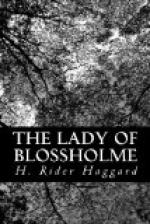“Nay, my Lord Abbot, I stand not between her and God and His holiness, but between her and man and his iniquity. Still I can tell you of that obstacle—which comes from God—if you so need.”
Now the old Prioress, blushing to her white hair, bent forward and whispered in the Abbot’s ear words at which he sprang up as though a wasp had stung him.
“Pest on it! it cannot be,” he said. “Well, well, there it is, and must be swallowed with the rest. Pity, though,” he added, with a sneer on his dark face, “since many a year has gone by since these walls have seen a bastard, and, as things are, that may pull them down about your ears.”
“I know such brats are dangerous,” interrupted Emlyn, looking Maldon full in the eyes; “my father told me of a young monk in Spain—I forget his name—who brought certain ladies to the torture in some such matter. But who talks of bastards in the case of Dame Cicely Harflete, widow of Sir Christopher Harflete, slain by the Abbot of Blossholme?”
“Silence, woman. Where there is no lawful marriage there can be no lawful child——”
“To take that lawful inheritance that it lawfully inherits. Say, my Lord Abbot, did Sir Christopher make you his heir also?”
Then, before he could answer, Cicely, who had been silent all this while, broke in—
“Heap what insults you will on me, my Lord Abbot, and having robbed me of my father, my husband, and my heart, rob me of my goods also, if you can. In my case it matters little. But slander not my child, if one should be born to me, nor dare to touch its rights. Think not that you can break the mother as you broke the girl, for there you will find that you have a she-wolf by the ear.”
He looked at her, they all looked at her, for in her eyes was something that compelled theirs. Clement Maldon, who knew the world and how a she-wolf can fight for its cub, read in them a warning which caused him to change his tone.
“Tut, tut, daughter,” he said; “what is the good of vapouring of a child that is not and may never be? When it comes I will christen it, and we will talk.”
“When it comes you will not lay a finger on it. I’d rather that it went unbaptized to its grave than marked with your cross of blood.”
He waved his hand.
“There is another matter, or rather two, of which I must speak to you, my daughter. When do you take your first vows?”
“We will talk of it after my child is born. ’Tis a child of sin, you say, and I am unrepentant, a wicked woman not fit to take a holy vow, to which, moreover, you cannot force me,” she replied, with bitter sarcasm.
Again he waved his hand, for the she-wolf showed her teeth.
“The second matter is,” he went on, “that I need your signature to a writing. It is nothing but a form, and one I fear you cannot read, nor in faith can I,” and with a somewhat doubtful smile he drew out a crabbed indenture and spread it before her on the table.




